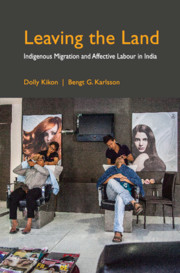Afterword: Bridging Ruptures
Published online by Cambridge University Press: 04 May 2019
Summary
Migration from the Northeast frontier to other parts of India (and beyond) has progressed from a peripheral topic a decade ago to an essential component for understanding the region. Leaving the Land adds further richness and texture to the journeys being undertaken by migrants, mostly youth from the Northeast India, to salons, hotels, and even agricultural lands all over India. These stories expand knowledge of Northeast migrants and labour markets beyond Delhi – the site where I explored the idea in the very early 2010s – to locations in south India in particular, demonstrating the extent of labour niches coveting Northeast migrants and the social, kin, and familial networks stretching from villages on the borders with Myanmar to villages in coastal Goa. Through these stories Kikon and Karlsson paint a picture of migrant life familiar to many young people who have left the Northeast over the years. Yet they also paint a picture of a region left behind that is fast becoming devoid of young people.
Many of those who remain are dreaming about leaving, and many of those who have returned are living with nostalgia for the life they lead outside the frontier. As the authors remind us throughout the book, the poignant issue facing the region in the contemporary age is retaining indigenous youth – or at the very least, encouraging their return – to ancestral homelands gravid with the memories, struggles, and uneven spoils of what Sanjib Baruah (2005) has famously called the ‘durable disorder’ of the Northeast. And it is on this last point that Leaving the Land brings us to another critical conjuncture in the history of the region.
* * *
The modern history of the Northeast can be thought of as a series of ruptures. Lund conceptualizes ruptures as ‘open moments’ (Lund 2016), moments when ‘opportunities and risks multiply, when the scope of outcomes widens, and when new structural architecture is erected’ (ibid.). As an analytical tool for accounting for change, ruptures are ‘dramatic and violent’ change as opposed to slower, incremental change (Lund 2016). As such, ruptures recalibrate notions of rights, entitlements, and the social and political order of different polities; and often the very constitution and boundaries of the polities in question.
- Type
- Chapter
- Information
- Leaving the LandIndigenous Migration and Affective Labour in India, pp. 134 - 138Publisher: Cambridge University PressPrint publication year: 2019



